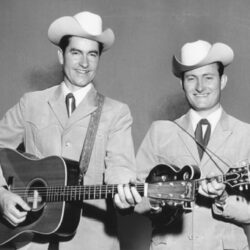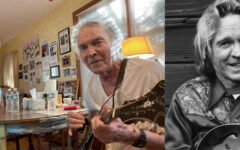
Here’s another interview conducted by the folks at the Mountains of Music Homecoming celebration, set to kick off tomorrow across southwestern Virginia. Dozens of events will be hosted that celebrate the music, culture, cuisine, and folkways of the Appalachian region, many of them highlighting the importance of this part of the state in the development of what we know today as bluegrass music.
One of the artists that is being celebrated this year is Jesse McReynolds, a Virginia native who with his brother, Jim, toured for more than 50 years as Jim & Jesse. Their distinctive brothers duets, along with Jesse’s unique mandolin style and his clever songs, won them fame across the country and widespread radio airplay from the early ’60s until the end of the century when Jim lost his battle with cancer.
Jesse sat recently for an interview with Ted Olson, a Professor in the Department of Appalachian Studies at East Tennessee State University, which we are pleased to share with our readers.
TO: On Friday, June 16, you will be performing just a stone’s throw away from where you grew up [Jesse McReynolds & the Virginia Boys will be performing at Lay’s Hardware Center for the Arts in Coeburn, Virginia, as one of the headlining acts of the 2017 Mountains of Music Homecoming]. What do you especially look forward to when you return home?
JM: Jim and I left there so long ago—in 1948—to make a living playing music, but I always like to go home and see kinfolks and acquaintances—people I haven’t seen in a long time. I have a lot of good memories from growing up there. And before the concert there I’ll show some films of us performing long ago. It will be like a true homecoming!
TO: Can you describe the kind of music you played in those days?
JM: When Jim got back from the Army, we formed a four-piece band—guitar, mandolin, fiddle, bass. We called the music we played back then country music, not bluegrass. We didn’t have a permanent banjo player, though my uncle Everett McReynolds played banjo during a couple of our shows near Coeburn. Uncle Everett couldn’t travel, so the banjo never really factored into our sound.
TO: The way you play the mandolin has been very influential–it is one of the foundational instrumental styles in bluegrass. How did you learn how to play that way?
JM: I started playing that way by ear—there weren’t any music instruction books available at that time. People have thought that I was influenced by Bill Monroe, but really Earl Scruggs was a much bigger influence on my style. I tried to play my mandolin similar to the way Earl played banjo, using rolls. From the first time I heard Earl on the Grand Ole Opry, I loved how he played, but of course I wanted to establish my own style of playing my instrument. Ultimately, I ended up playing the opposite of what he did—my rolls went backwards, while Earl’s rolls went forward. Earl would often compliment me for my playing, which meant so much to me.
TO: Do you still practice everyday like you did early on, or has that regimen changed?
JM: I will be 88 in July, but I know I need to practice as often as possible because I still perform regularly. In 2017 I will perform at Mountains of Music Homecoming, the Grand Ole Opry, Bean Blossom, Rhythm and Roots Reunion, and other places. So I try to play a little every day.
TO: Your grandfather Charles McReynolds recorded at the 1927 Bristol Sessions, the so-called “Big Bang of Country Music.” When you were young, were you and Jim and other members of your family aware of your grandfather’s participation in such an historically important event? What does that mean to you now?
JM: That did not mean much to us back then because my grandfather was an amateur musician, not a professional act like The Carter Family or Jimmie Rodgers. I didn’t realize that my grandfather was part of those sessions until 50 years after they happened. Recently Carl Jackson included me on his Bristol Sessions tribute album [Orthophonic Joy]; I played the tune my grandfather played in 1927 [The Girl I left Behind Me] on my grandfather’s fiddle!
TO: You’ve performed in a lot of different places over the years. Could you describe your most memorable performance?
JM: That would have to be when Jim and I were inducted into the Grand Ole Opry in 1964. We had been guests on the Opry during the early 1960s, invited by Flatt & Scruggs and by Bill Monroe. But in 1964 the Martha White flour company persuaded the Opry to make us permanent Opry members even though we never had a major country hit. We were in the right place at the right time because Martha White had noticed how popular we were in Georgia and Florida, where we had been appearing regularly on four local television shows.
Television was new in many homes back then, and some people would dress up as if they were going to a concert, thinking that we were in their living room performing just for them!
TO: In 1965 you and Jim released the album Berry Pickin’ in the Country featuring your interpretations of Chuck Berry songs. What led you both to record that album and how did your fans react?
JM: Our label Epic Records asked us to do something different for our next album, so we covered some Chuck Berry songs. We weren’t sure how the album would be received—there were racial problems across the South in 1965—but we really liked his songs. As it happened, Berry Pickin’ in the Country became one of our most popular albums. I regret that we didn’t have Chuck playing on the album, but at least he wrote the liner notes.
TO: From your perspective, what are some contributions of The Crooked Road and Mountains of Music Homecoming?
JM: They both educate people, allow people to learn where the music came from. For example, I wouldn’t know about the importance of the Bristol Sessions if not for some people researching the story and telling it to others. I have learned many things along The Crooked Road.
TO: What have you been up to lately, musically speaking?
JM: I’ve been on the TV show Nashville, as an actor and not as a musician. I played a blind man, so not many people recognized me [McReynolds laughs]. A few years ago I recorded a whole album of Grateful Dead songs. Jerry Garcia and others in the band liked Jim & Jesse’s music, and I like their music, so that project was a natural for me.
TO: What about future plans for your music?
JM: I’m planning an album focusing on my grandfather’s repertoire, and it will feature the fiddle he played at the Bristol Sessions. Also, I hope to make more recordings featuring my mandolobro [an instrument combining the mandolin and the dobro]. And I plan to record with singer Valerie Smith. I really like many different types of music, so there’s no telling what I’ll want to play next.
All of the events scheduled under the Mountains of Music Homecoming banner can be seen on their web site. The eight-day extravaganza is put together by a number of arts and cultural agencies in Virginia, primarily The Crooked Road, with the help of numerous corporate and regional sponsors, using the power of Appalachian music as a tourism draw for the state. The weather looks good for the next week, so come on down to southwest Virginia and enjoy what the state has to offer.








